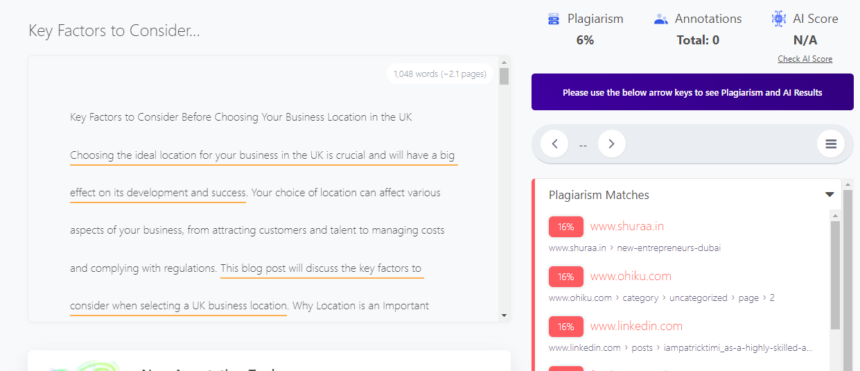Choosing the ideal location for your business in the UK is crucial and will have a big effect on its development and success. Your choice of location can affect various aspects of your business, from attracting customers and talent to managing costs and complying with regulations.
This blog post will address the most significant considerations to make when selecting a UK business location.
Why Location is an Important Factor for a Business?
Picking the right place is crucial for every business. It’s not only about accessibility and effectiveness but also about determining whether your efforts were successful or not. A strategic location can be the key to attracting your target audience, optimising logistics, and boosting brand visibility.
Conversely, a poorly chosen location may reduce foot traffic, recruitment challenges, and regulatory hurdles. Businesses must consider demographics, competition, infrastructure, and costs to make wise decisions. By evaluating these factors, businesses can prepare for growth and competition.
Key Factors to Consider While Choosing the Location for Business
Selecting the optimal location for your business in the UK requires meticulous consideration. These include:
Accessibility and Transportation
Accessibility and transportation significantly impact the convenience of accessing your business premises. Consider the proximity to airports, train stations, and motorways.
Furthermore, evaluating the accessibility and reliability of public transportation options for your workforce is essential. A location with excellent accessibility can enhance the reachability of customers, improve employee satisfaction, and optimise operational efficiency.
Also, evaluate future transportation advancements in the region, such as upcoming infrastructure projects or enhancements in public transportation. By focusing on accessibility and transportation when choosing your location, you can guarantee smooth connectivity and effectively support your business operations.
Demographics and Target Market
Knowing the characteristics of the region where you want to start your business is crucial for reaching the customers you want. Consider the number of residents, their age, income, and hobbies. You’ll likely get and keep customers if you pick a place for your business that matches the people you want to sell to.
Additionally, analyse local residents’ buying power and habits to understand the demand for your offerings. Conduct market studies to find any gaps or opportunities your business can seize. Meeting your target market’s needs can help your business be profitable.
Competition and Market Saturation
Completely researching nearby businesses is crucial to comprehending the competitive environment and market saturation. Find direct and indirect rivals, evaluate their strengths and weaknesses, and examine their portion of the market.
Evaluating the local competition is crucial to your business’s success. This includes evaluating the number of similar businesses, customer demand, and pricing dynamics. It’s also important to identify any niche markets or untapped opportunities that your business can capitalise on to establish a strong market position.
Regulatory Environment and Business Support
It is essential to have a good understanding of the regulatory environment in the location where you intend to conduct your business. This is important to ensure compliance and minimise potential legal risks.
You should research zoning laws, permits, licences, and other regulatory requirements for your industry and business activities. It is crucial to ensure that your business operations align with local regulations to avoid any fines, penalties, or legal issues.
Check for support programs, incentives, and resources offered by local authorities or business organisations. Attend networking events and consult experts to guide regulations. By proactively addressing regulatory considerations and leveraging available business support resources, you can establish a strong foundation for your business in the UK.
Ease of Getting Necessary Permits
When choosing a business location, the ease of obtaining necessary permits and licences is crucial. Understanding local zoning laws and regulatory requirements is essential to ensure compliance and avoid legal issues. Research the process for acquiring permits and the time it takes, as well as any associated costs.
Seek locations with streamlined procedures and supportive local authorities or business organisations that offer guidance and assistance. Efficient permit acquisition helps to minimise delays, reduce costs, and establish a strong operational foundation for your business.
It’s important to note that no matter where you set up your business in the UK, certain permits are compulsory. These include health and safety permits, environmental permits, and specific industry-related licenses. Additionally, if you plan to employ non-UK residents, obtaining a sponsor licence is mandatory. Learn about different types of sponsor licences in the UK.
Infrastructure and Amenities
To ensure smooth business operations, assess infrastructure and amenities in your chosen location. Evaluate utilities like electricity, water, and internet. A robust infrastructure guarantees uninterrupted business activities.
When choosing a business location, consider nearby restaurants, shopping centres, and recreation facilities. These amenities can significantly improve the quality of life for employees and can contribute to increased employee satisfaction and productivity.
Having amenities nearby can also boost visitor numbers to your company. Assess area safety and security, including crime rates and emergency services. Establish a secure environment to build trust among employees, customers, and stakeholders. Prioritise infrastructures and amenities for business growth and success.
Cost of Living and Business Expenses
Assess the cost of living and business expenses in potential locations to manage your budget effectively and maximise profitability. Compare factors such as rent, utilities, taxes, and wages across different areas to ensure affordability. Consider both fixed and variable expenses for financial viability.
Check the living expenses for workers in the area to draw in and keep good talent. A place where living costs are fair can help you get skilled workers and cut down on workers leaving. Also, think about how easy it is to get and how much it costs to rent space for your business.
Furthermore, look into the taxes in the spot you pick, like business taxes, sales taxes, and any other taxes you need to pay. Knowing about taxes can help you plan better and pay less in taxes.
Future Growth and Expansion Opportunities
Thinking ahead about growing and expanding is important for lasting success. Look at how the economy might grow and how many more people might move to your chosen place. Also, check if there are any plans to build things like roads or buildings or if people are investing money, which could mean there’s more growth coming.
Look at whether the place can handle your plans to grow your business. Consider adequate land and space for commercial establishments, verify compliance with building regulations, and ascertain the availability of necessary resources and skilled labour. A place that can grow with you means you won’t have to move your business a lot.
Any business needs skilled manpower to expand. Employing foreign workers can facilitate this. In that case, the employer must hold a sponsor licence. Employers must fulfil some specific requirements to obtain a sponsor’s licence. Consider seeking expert advice on worker sponsorship to ensure this process is done accurately following the compliance.
Conclusion
Selecting the appropriate business site in the UK demands careful thought regarding accessibility, demographics, competition, and infrastructure. By prioritising these factors, you can establish a strong basis for success and position your business for growth and sustainability in the dynamic UK market.








